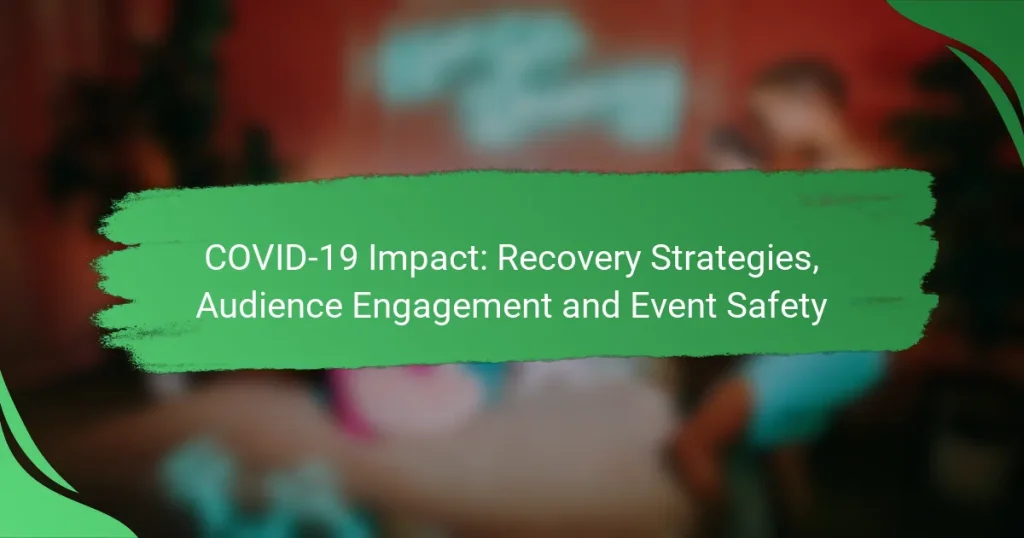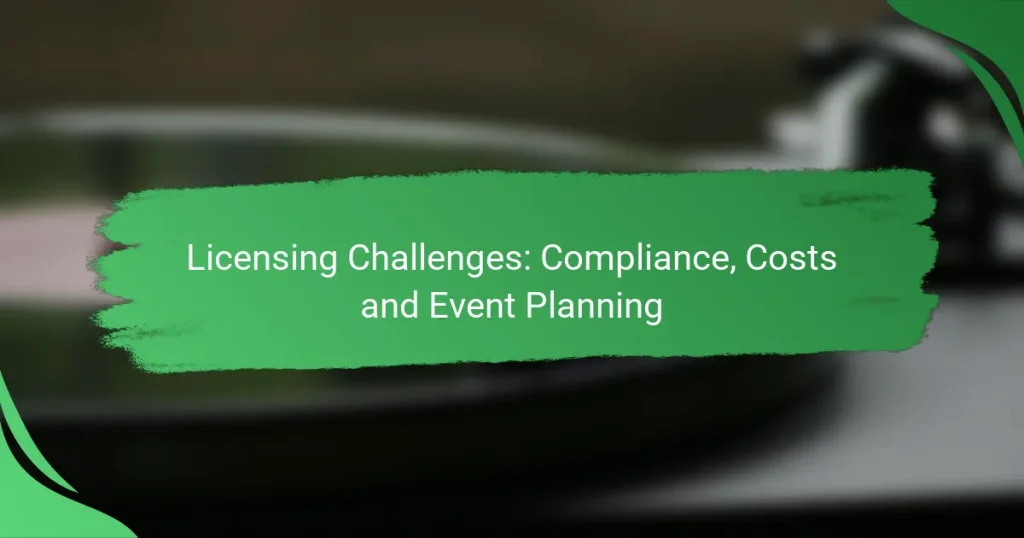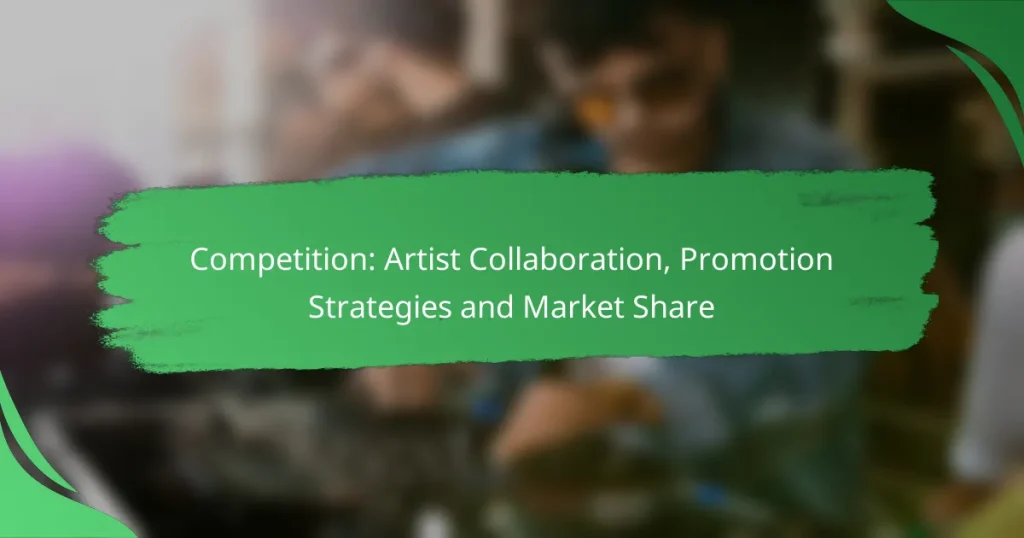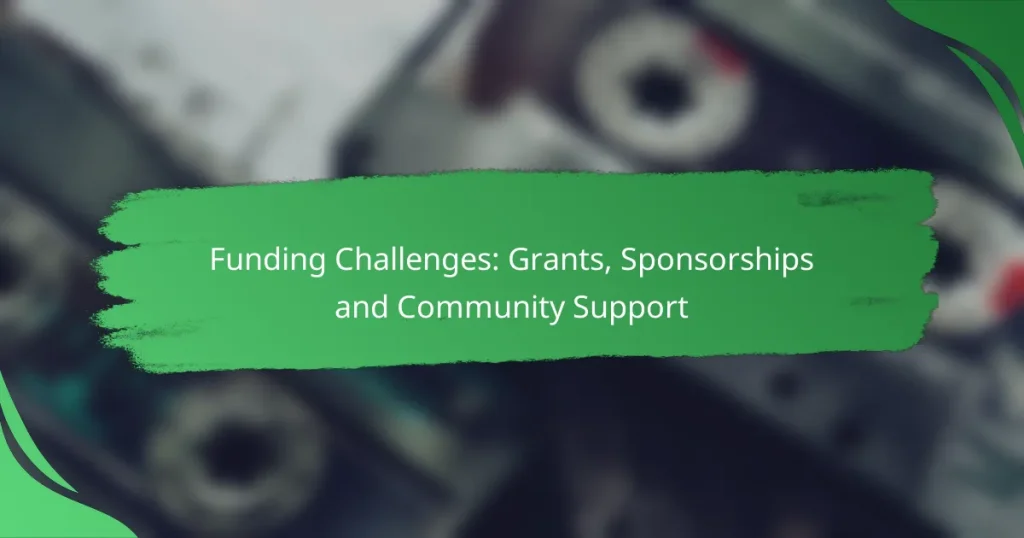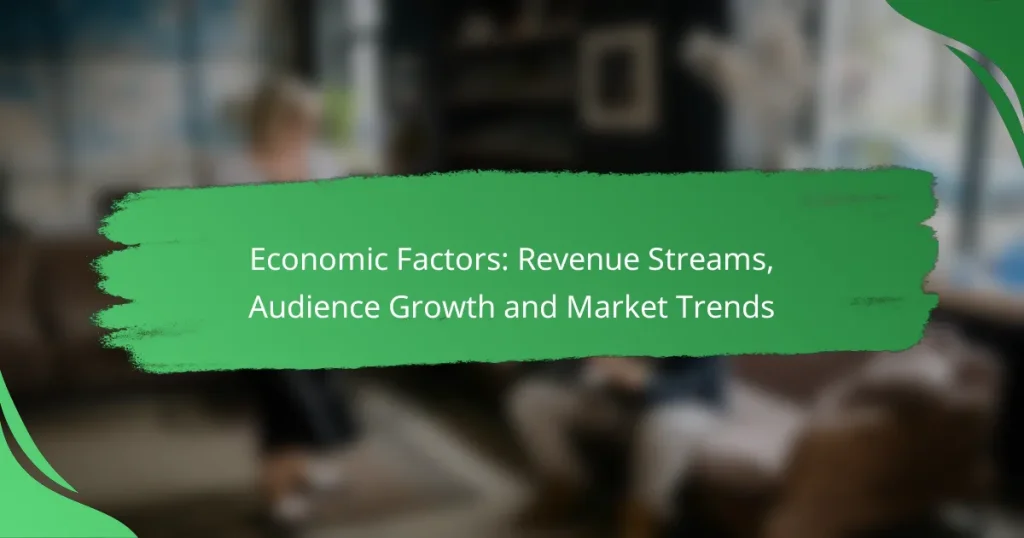The local music scene faces several challenges, including limited venue availability, funding issues, and competition from larger markets. These obstacles can impede the growth of local artists and events, making it essential for musicians to explore alternative funding avenues like crowdfunding and local grants. Additionally, local music festivals play a crucial role in providing exposure for artists while fostering community engagement and boosting local economies.
COVID-19 Impact: Recovery Strategies, Audience Engagement and Event Safety
Licensing Challenges: Compliance, Costs and Event Planning
Competition: Artist Collaboration, Promotion Strategies and Market Share
Local Government: Support Programs, Funding Opportunities and Policy Impact
Funding Challenges: Grants, Sponsorships and Community Support
Economic Factors: Revenue Streams, Audience Growth and Market Trends
What are the main challenges in local music scenes?
The main challenges in local music scenes include limited venue availability, funding and sponsorship issues, and competition from larger markets. These factors can significantly hinder the growth and sustainability of local artists and events.
Limited venue availability
Local music scenes often struggle with a shortage of venues that can host live performances. Many cities have a limited number of spaces that cater specifically to music, which can restrict opportunities for artists to showcase their work.
Venues may also have strict regulations regarding noise levels, capacity, and operating hours, making it difficult for local acts to find suitable places to perform. Artists should consider collaborating with existing venues or exploring alternative spaces like community centers or outdoor locations to expand their performance options.
Funding and sponsorship issues
Securing funding and sponsorship is a common hurdle for local music scenes. Many artists rely on grants, donations, or sponsorships from local businesses to support their projects and performances.
However, competition for these funds can be fierce, and many sponsors may prefer to invest in more established acts or larger events. Local musicians should actively network with businesses and seek out community partnerships to increase their chances of obtaining financial support.
Competition from larger markets
Local music scenes frequently face stiff competition from larger markets that attract more attention and resources. Major cities often have well-established music industries, drawing talent and audiences away from smaller locales.
To combat this, local artists should focus on building a strong community presence and fostering connections with their audience. Engaging in social media marketing and collaborating with other local musicians can help create a unique identity that sets them apart from larger markets.
How can local musicians overcome funding challenges?
Local musicians can overcome funding challenges by exploring various financial avenues such as crowdfunding and local grants. These options provide essential resources to support their projects and sustain their careers.
Crowdfunding platforms like Kickstarter
Crowdfunding platforms, such as Kickstarter, allow musicians to raise funds directly from fans and supporters. By creating a compelling campaign, artists can offer rewards in exchange for contributions, which can range from digital downloads to exclusive merchandise.
Successful campaigns often set realistic funding goals and promote them through social media and local events. Musicians should engage with their audience, providing updates and expressing gratitude to backers, which can foster a loyal community.
Local grants and sponsorships
Local grants and sponsorships are valuable resources for musicians seeking financial support. Many arts organizations and government bodies offer grants specifically for music projects, which can cover recording costs, equipment, or promotional activities.
To secure these funds, musicians should research available grants in their area, paying attention to eligibility criteria and application deadlines. Building relationships with local businesses for sponsorship opportunities can also provide additional funding and promotional support, enhancing visibility within the community.
What role do local music festivals play?
Local music festivals serve as vital platforms for artists to gain exposure and connect with audiences. They foster community engagement and can significantly impact local economies by attracting visitors and generating revenue.
Showcasing local talent
Local music festivals provide a stage for emerging artists to present their work to a broader audience. These events often feature a diverse lineup, allowing musicians from various genres to share their unique sounds. For instance, a festival might include everything from indie rock to folk, giving local talent a chance to shine.
Additionally, festivals can help artists network with industry professionals, which may lead to future opportunities such as gigs, collaborations, or record deals. This exposure is crucial for artists looking to build a sustainable career in music.
Attracting tourism and sponsorship
Local music festivals can draw significant tourism, as attendees often travel from nearby cities or even other countries. This influx of visitors can benefit local businesses, including hotels, restaurants, and shops, contributing to the overall economy. For example, a well-promoted festival might see thousands of attendees, boosting sales for local vendors.
Sponsorship opportunities also arise from these festivals, as businesses seek to align themselves with popular events. Local companies may sponsor stages or provide services in exchange for advertising, creating a mutually beneficial relationship that enhances the festival experience while promoting local brands.
How can collaboration improve the local music scene?
Collaboration can significantly enhance the local music scene by fostering connections among artists, venues, and audiences. By working together, musicians can share their talents, resources, and promotional efforts, leading to a more vibrant and supportive community.
Joint events and promotions
Joint events and promotions allow multiple artists to come together for concerts, festivals, or showcases, which can attract larger audiences. For example, a local venue might host a night featuring several bands, reducing individual costs and increasing ticket sales. This collaborative approach can also enhance marketing efforts, as artists can leverage each other’s fan bases to reach new listeners.
When organizing joint events, consider creating a unified theme or genre focus to appeal to specific audiences. Additionally, effective communication and planning are essential to ensure all parties are aligned on logistics, promotion, and revenue sharing.
Shared resources among musicians
Sharing resources among musicians can alleviate financial burdens and improve overall quality. This could include sharing rehearsal spaces, equipment, or even marketing tools. For instance, a group of local artists might pool funds to rent a studio, allowing them to record high-quality tracks at a lower individual cost.
Musicians can also collaborate on promotional materials, such as flyers or social media campaigns, which can save time and money. Establishing a local network or cooperative can facilitate these exchanges and strengthen relationships within the music community.
What are effective marketing strategies for local artists?
Effective marketing strategies for local artists include leveraging social media and forming partnerships with local businesses. These approaches help build a community presence and increase visibility, which is crucial for attracting local audiences and potential fans.
Social media engagement
Social media engagement is vital for local artists to connect with their audience and promote their work. Platforms like Instagram, Facebook, and TikTok allow artists to share their music, behind-the-scenes content, and upcoming events, fostering a personal connection with fans.
To maximize impact, artists should post regularly, interact with followers, and use relevant hashtags to reach a broader audience. Engaging with local music groups or forums can also enhance visibility and create a supportive network.
Partnerships with local businesses
Forming partnerships with local businesses can provide mutual benefits for artists and establishments. Collaborations may include hosting live performances at cafes or art galleries, which can draw in customers while giving artists a platform to showcase their talent.
Artists should approach local businesses with clear proposals that outline potential benefits, such as increased foot traffic or promotional opportunities. Offering to cross-promote through social media can further strengthen these partnerships, creating a win-win situation for both parties.
How do local music scenes impact community identity?
Local music scenes play a crucial role in shaping community identity by reflecting cultural values and fostering connections among residents. They create a sense of belonging and pride, which can enhance social cohesion and local engagement.
Fostering cultural pride
Local music scenes celebrate unique cultural expressions, allowing communities to showcase their heritage and traditions. This pride often manifests in events like festivals and concerts that highlight local artists, drawing attention to the distinct sounds and styles that define a region.
For example, a town known for its folk music may host annual gatherings where local musicians perform, attracting visitors and reinforcing community identity. Such events not only promote local talent but also instill a sense of pride among residents.
Encouraging community engagement
Active participation in local music scenes encourages residents to engage with one another, fostering relationships and collaboration. Music events often serve as social hubs where people gather to share experiences, ideas, and support local artists.
Communities can enhance engagement by organizing open mic nights or community jam sessions, inviting residents to participate regardless of skill level. These inclusive activities help build a stronger, more connected community while promoting local culture.
What are the emerging trends in local music scenes?
Emerging trends in local music scenes include the integration of technology, a focus on sustainability, and the growth of virtual concerts. These trends reflect changing audience expectations and the need for adaptability in the music industry.
Integration of technology in performances
Technology is increasingly becoming a vital part of live music performances. Artists are using advanced sound systems, visual effects, and interactive elements to enhance the audience experience. For instance, many local bands now incorporate live streaming to reach wider audiences beyond their immediate geographic area.
Musicians should consider investing in quality audio-visual equipment and software to create immersive experiences. Collaborating with tech-savvy professionals can also help in effectively integrating these technologies into performances.
Focus on sustainability in events
Sustainability is gaining traction in the organization of local music events. Many venues and promoters are adopting eco-friendly practices, such as reducing waste, using renewable energy, and sourcing local food and beverages. This shift not only appeals to environmentally conscious audiences but can also reduce operational costs.
Event organizers should prioritize sustainable practices by implementing recycling programs and encouraging carpooling among attendees. Partnering with local businesses that share these values can further enhance the event’s sustainability efforts.
Growth of virtual concerts
The rise of virtual concerts has transformed how local artists connect with their audiences. These online events allow musicians to perform from anywhere, reaching fans who may not be able to attend in person. Platforms like YouTube and Twitch have become popular venues for these performances.
Artists should explore various streaming options and engage with their audience through interactive features like live chats. Offering exclusive content or merchandise during virtual events can also enhance viewer engagement and generate additional revenue.

